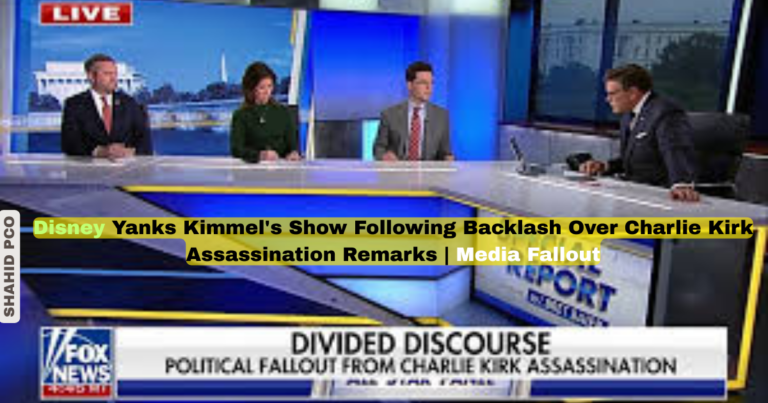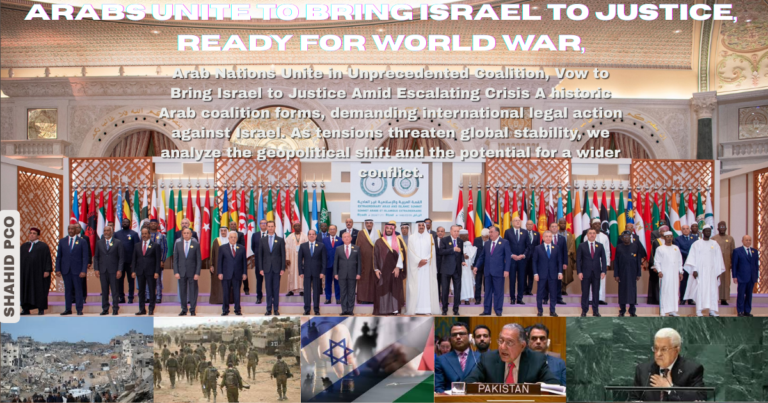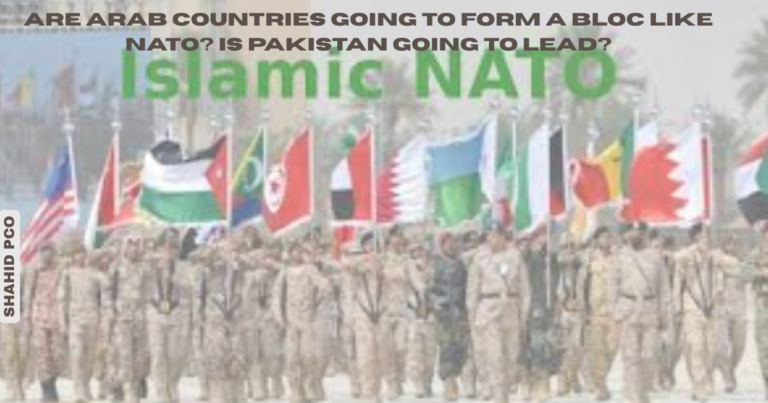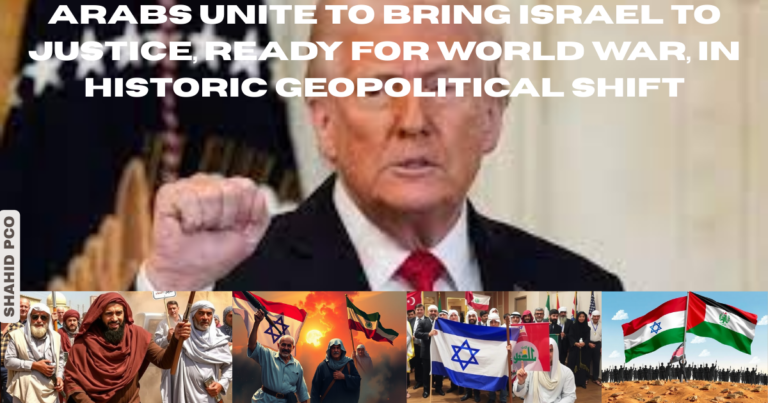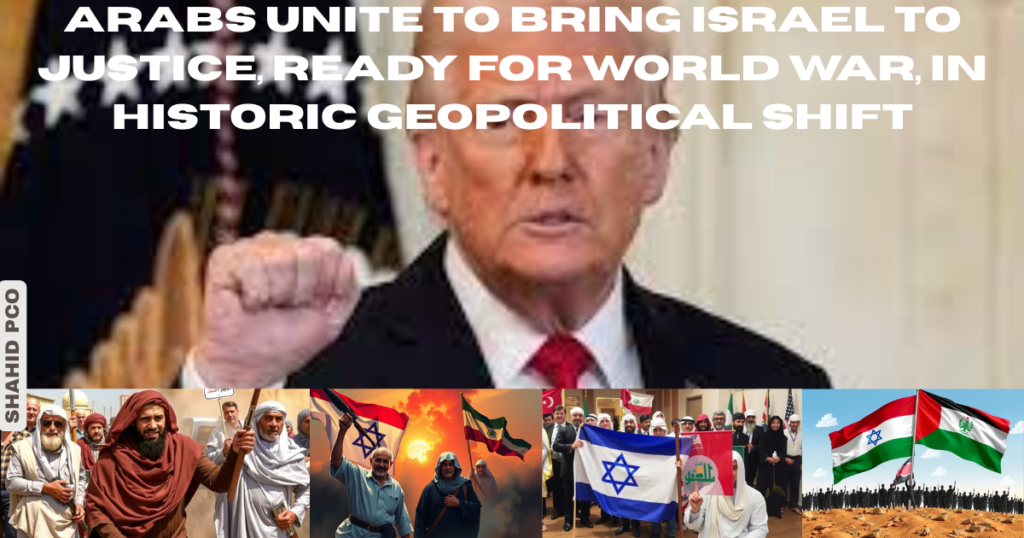
Arabs Unite to Bring Israel to Justice, Ready for World War, in Historic Geopolitical Shift
Arabs Unite to Bring Israel to Justice, Ready for World War, in Historic Geopolitical Shift In a move that signals a seismic shift in Middle Eastern politics and global power dynamics, a coalition of Arab nations has announced a unified, unprecedented campaign to bring Israel to justice through international legal channels. The rhetoric emanating from the emergency summit has been stark, with key leaders stating the collective is ready for world war if necessary to achieve their aims, marking a dangerous escalation in regional tensions.
A Unified Front: From Rhetoric to Legal Action
For decades, the Arab world’s stance on Israel has often been fragmented. However, the recent summit in Cairo demonstrated a newfound, formidable unity. Spearheaded by regional powers, the coalition has agreed upon a multi-pronged strategy:
- International Court of Justice (ICJ): Filing a new, comprehensive case accusing Israel of violating the Genocide Convention and numerous international humanitarian laws. The case is backed by a consortium of Arab states, giving it significant political weight.
- International Criminal Court (ICC): Lobbying the ICC to expedite its ongoing investigation into alleged war crimes and to issue arrest warrants for high-ranking Israeli political and military figures.
- Diplomatic and Economic Isolation: A coordinated effort to isolate Israel diplomatically and impose severe economic sanctions through boycotts and lobbying international partners.
This concerted effort to bring Israel to justice moves the conflict from the battlefield to the courtrooms of The Hague, a strategic shift that poses a significant challenge to Israeli and Western diplomacy.
The Stark Warning: “Ready for World War”
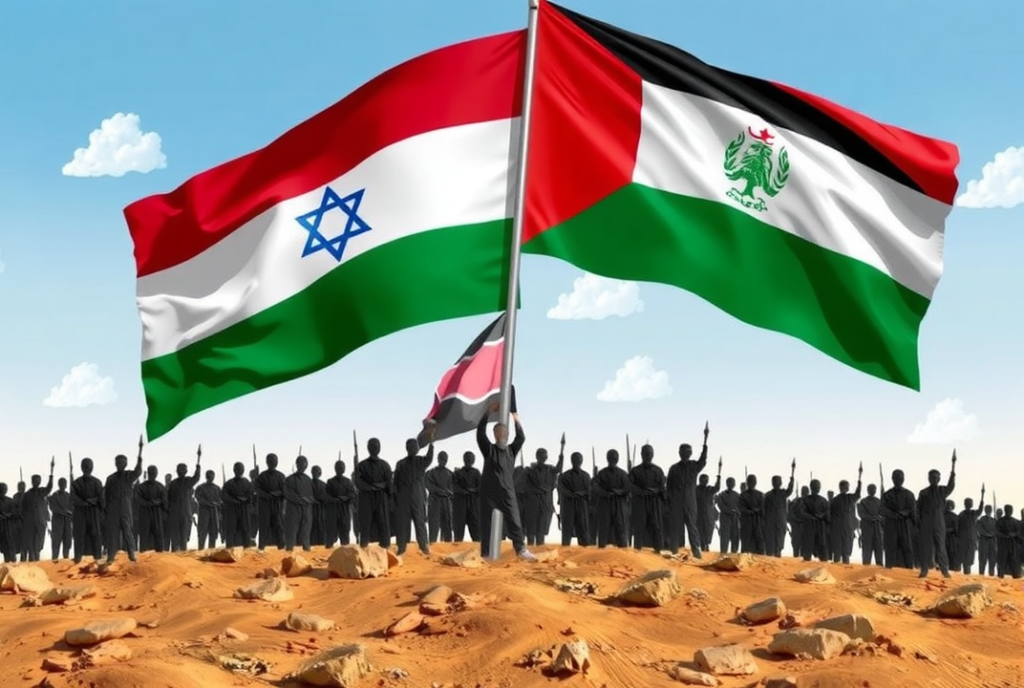
The most alarming aspect of the summit was the language used by several leaders. The phrase “ready for world war” was not uttered lightly. It serves as a direct message to Israel’s allies, particularly the United States and Western Europe, that the consequences of unwavering support could be catastrophic and global.
Analysts interpret this not as a desire for conflict, but as a calculated deterrent. It signals that any military intervention against the coalition’s efforts, or a significant escalation in Gaza and the surrounding region, could trigger a broader conflict involving regional armies and proxy forces across the Middle East, potentially drawing in global powers.
Global Reactions and the Specter of Escalation
The international response has been one of deep concern.
- The United States and NATO: Have called for immediate de-escalation, reaffirming their commitment to Israel’s security while expressing “grave concern” over the inflammatory rhetoric. The Pentagon has reportedly placed certain forces in the region on heightened alert.
- European Union: Faces internal division, with some members advocating for a more critical stance toward Israel and others cautioning against actions that could legitimize the threat of force.
- Russia and China: Have seized the opportunity to criticize Western hegemony. Both nations have called for restraint while positioning themselves as potential mediators, aiming to expand their influence in the region at the expense of the U.S.
The fear among diplomats is a miscalculation. If the legal campaign fails to yield the desired results, the hardline factions within the Arab coalition may push for more direct action, making the threat of being ready for world war a self-fulfilling prophecy.
Historical Context: Why This Time is Different
Previous conflicts between Israel and its neighbors have often been bilateral or involved non-state actors. The current declaration of unity is historically significant because it involves:
- State-Action: This is not a statement from a militant group but from sovereign nations with modern armies and international standing.
- Legal Focus: The primary battleground is international law, a domain where Israel and its allies have traditionally enjoyed a defensive advantage.
- Global Audience: The messaging is designed for a world audience fatigued by conflict and increasingly sympathetic to the Palestinian cause, applying maximum soft power pressure.
Arabs Unite to Bring Israel to Justice, Ready for World War, in Historic Geopolitical Shift
Conclusion: A Precarious Juncture
The world now watches nervously as this coalition moves to bring Israel to justice. The pursuit of legal accountability, while a legitimate avenue under international law, is now shrouded in the threat of catastrophic conflict. The phrase ready for world war has fundamentally altered the stakes, transforming a regional conflict into a potential flashpoint for a global crisis.
READ MORE:Top 5 Reasons Arab Unity Could Change the Middle East Forever
Whether this is a masterstroke of diplomatic pressure or a dangerous step toward irreversible escalation remains to be seen. The coming weeks, particularly the actions at the UN, ICJ, and ICC, will determine whether the path forward lies in the courtroom or on the battlefield.
FAQ Section
Q: What does “bring Israel to justice” mean specifically?
A: It refers to a coordinated legal effort by multiple Arab nations to prosecute Israeli officials at the International Criminal Court (ICC) for alleged war crimes and to file a case against Israel at the International Court of Justice (ICJ) for violating the Genocide Convention.
Q: Which Arab countries are involved in this unity?
A: While the coalition is led by regional powers, the emergency summit included members of the Arab League, suggesting a broad consensus. Key nations driving the initiative are believed to be those with significant political and economic influence in the region.
Q: Is a world war likely?
A: Most analysts believe a full-scale global war is still unlikely due to mutually assured destruction and economic interdependence. However, the rhetoric significantly increases the risk of a major regional war that could draw in global powers, making the situation extremely volatile.
Q: How has Israel responded?
A: Israel has condemned the move as a “political witch-hunt” and an “attempt to demonize the Jewish state.” It has accused the coalition of ignoring the actions of Hamas and has vowed to defend itself “by any means necessary.”
